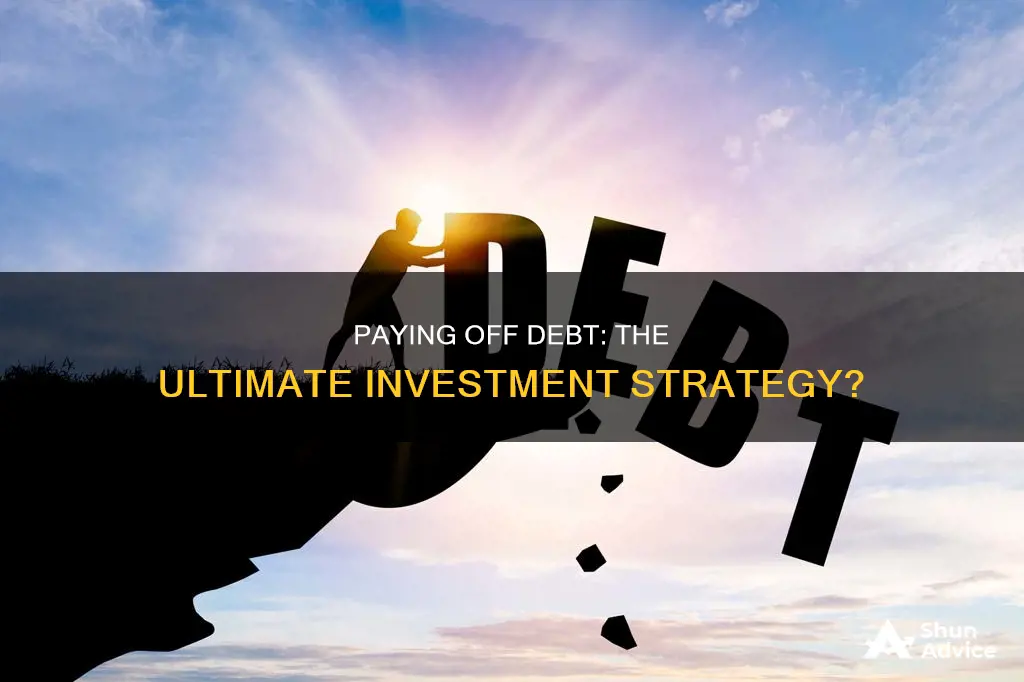
Paying off debt or investing extra cash is a common dilemma. Both are good uses for any spare cash, but which is the best choice?
The answer depends on your financial situation and goals. If you have high-interest debt, such as credit card debt, it's often better to focus on wiping that out first. Credit card interest rates can be very high, often over 20%, and the longer you leave it, the more you'll pay in interest.
On the other hand, investing can be a good way to grow your money over time, especially if you're investing for the long term. However, investments can be volatile and are not guaranteed to perform well.
So, if you're deciding between paying off debt or investing, consider factors such as the interest rate on your debt, your expected investment returns, your risk tolerance, and your financial goals. It's also important to have an emergency fund and to take advantage of any employer-matching retirement plans.
| Characteristics | Values |
|---|---|
| Interest rate on debt | If the interest rate on your debt is 6% or greater, it is generally recommended to pay down debt before investing. |
| Interest rate on investments | If you can earn more on your investments than your debts are costing you in interest, it makes sense to invest. |
| Credit score | Paying off debt can improve your credit score, which is important if you want to borrow money in the future. |
| Risk tolerance | If you are comfortable taking the gamble that your investments will fluctuate with the markets, you are a better candidate for investing than someone who would worry about market fluctuations. |
| Peace of mind | If debt is causing you stress, there is nothing wrong with paying it down sooner. |
| Emergency fund | It is recommended to save an emergency fund before investing or paying off debt. |
| Retirement plan | It is recommended to take advantage of employer-matched retirement plans before investing or paying off debt. |
What You'll Learn

Paying off high-interest debt vs. investing
Overview
When you have extra cash, it can be challenging to decide whether to pay off debt or invest it. Both are sensible options, and many people do a combination of both. However, there are some key considerations to help you decide which to prioritise.
The Case for Investing
If you can earn more interest on your money by investing it than you are paying in interest on your debts, then investing may be the better option. For example, if you have a mortgage with a 5% interest rate and a stock market index fund returning 10% per year, you will benefit more by investing in the index fund.
However, investments can be volatile, and it is not always easy to predict how they will perform. Investments that pay a guaranteed interest rate, such as bank certificates of deposit (CDs) and U.S. Treasury bills, tend to have low rates of return that rarely exceed the interest rates charged by credit card companies and other lenders.
Another factor to consider is your risk tolerance. If you are comfortable with the idea that your investments may rise and fall with the markets, you may be more suited to investing than someone who would worry about potential losses.
The Case for Paying Down Debt
There are several good reasons to choose to pay down debt rather than invest. Firstly, if your debt has a high interest rate, you may be better off paying it off as quickly as possible. This is especially true of credit card debt, which often has high interest rates. The average interest rate on credit cards tracked in Investopedia's credit card database was 24.37% as of April 2024, a rate that few investments can match.
Another reason to prioritise paying off debt is to improve your credit score. Your credit score is important if you want to borrow money in the future, such as for a mortgage or car loan. It can also affect things like insurance premiums, renting an apartment, and even your employment prospects.
Paying off debt can also give you peace of mind. If you are losing sleep over your debts, you may be better off repaying them, even if you could get a better return on your money by investing.
The Case for Doing Both
You do not necessarily have to choose between paying off debt and investing. Many people do both. For example, you could use some of your money to create an emergency fund, while using the rest to pay down your debts. A good place to keep your emergency fund is in a low-risk and highly liquid investment, such as a money market mutual fund.
How to Pay Off Debts
If you decide to use your spare cash to pay off your debts, you should start by paying off the debts with the highest interest rates first. For example, if you have two credit cards, one charging 20% interest and the other 15%, tackle the 20% balance first.
Another option is to transfer your credit card balances to a card with a lower interest rate or take out a debt consolidation loan. This will reduce the number of debts you have to worry about and ideally lower the interest rate you are paying.
When to Seek Debt Relief
If you are really deep in debt and your spare cash won't make a dent in it, you may need to consider other options. Contact your lender, as they may be willing to reduce your minimum payment or interest rate. You could also hire a reputable debt relief company to negotiate on your behalf, but be aware of potential scams in this area.
Mortgage Dilemma: Pay Off or Invest?
You may want to see also

The pros of paying off debt first
Paying off debt first can be a great feeling, and it comes with several benefits. Here are some reasons why it might be a good idea to prioritize debt repayment:
- Improved cash flow and financial freedom: Eliminating debt means eliminating monthly payments, which results in more cash on hand each month. This extra money can be put toward other financial goals, such as savings or purchases, improving your overall quality of life.
- Stress relief: The more debt you have, the more stressful your financial situation can be. Paying off debt can alleviate the stress associated with owing money, bringing you closer to financial peace of mind.
- No more interest payments: When your debt is paid off, you no longer have to worry about interest charges. This means you'll be putting your money toward something you directly benefit from, instead of paying extra to lenders.
- Better secure your future: By reducing your debt, you'll be in a better financial position. The money that would have gone towards debt payments can now be directed into an emergency fund, retirement account, or other investments to secure your financial future.
- Improved credit score: Depending on the type of debt, paying it off can positively impact your credit score. For example, eliminating credit card debt will likely improve your credit score, as it reduces your credit utilization ratio, which accounts for about a third of your FICO score.
- Avoid legal issues: Prioritizing the repayment of tax debt and debt in collections can help you avoid potential legal consequences.
- Quick wins and motivation: Using the snowball method, where you pay off the smallest debts first, can provide quick wins and boost your motivation to stay on track with your debt repayment journey.
Quantum Computers: The Next Investment Boom
You may want to see also

The benefits of investing early
Investing early has many benefits, and it is a good idea to start as soon as possible. Here are some reasons why:
Time allows you to take risks
Those who invest early have more time to recover if something goes wrong, so they can afford to take more risks. Volatile investments often yield the highest returns, and early investors have the opportunity to make riskier moves. Starting early means you can be more adventurous with your investments, which can pay off in the long run.
Compound interest really makes a difference
Compound interest is interest earned on interest. By reinvesting your earnings, you can exponentially increase your return on investment. The earlier you start, the more time your money has to grow, and the more you will benefit from compound interest.
Your spending habits will improve
Investing early encourages disciplined spending habits and a focus on budgeting and cutting expenses. This is a valuable skill that will benefit you throughout your life, helping you to save and invest more effectively.
You'll be a step ahead of everyone else
The earlier you start investing, the better your financial situation will be in the future. You will be able to afford things that others can't and will be prepared for any financial instability that may come your way.
Your quality of life will improve
Investing early reduces the risk of being forced to make reckless choices to secure a stable retirement. It can also provide financial freedom, allowing you to pursue your passions without being financially strapped to a job you hate.
Other benefits
- Financial security: Investing early secures your financial future and provides a safety net in case of emergencies.
- Early retirement: If you start investing early, retiring early becomes an option.
- Experience: The earlier you start, the more time you have to gain experience and become a seasoned investor. This will help you avoid scams and make better investment decisions.
- Form better financial habits: Early investors are more likely to develop good financial habits, such as avoiding debt and spending less than they earn.
- The investing bug: Starting early can spark a passion for investing that will motivate you to stay informed, earn more, and make impulse purchases less often.
- Higher risk tolerance: The more time you have, the more financial risk you can take on. Young investors can build more aggressive portfolios that can produce larger gains.
GameStop Investors: Who's In?
You may want to see also

When to invest before paying off debt
Overview
It can be challenging to decide whether to pay off debt or invest, and the answer is not the same for everyone. However, there are some key considerations to help you decide.
Compare interest rates and expected returns
If you can earn more on your investments than your debts are costing you in interest, then investing may be the better option. Compare the interest rate on your debt with the return you expect to earn on your investments and put your money towards the option with the higher percentage.
For example, if you have a mortgage with a 5% interest rate and a stock market index fund returning 10% per year, investing in the index fund would be the better choice. On the other hand, if you have credit card debt at 20%, it would be better to put your money towards paying off that debt.
Risk tolerance
Another factor to consider is your risk tolerance. Investments can be volatile, and you may be comfortable with the gamble that your investments will rise and fall with the market. If you are losing sleep over your debts, then you may be better off repaying them, even if you could earn a better return by investing.
Credit score
Paying down debt, especially credit card debt, can improve your credit score. Your credit score is important if you want to borrow money in the future, such as for a mortgage or car loan. It can also affect insurance premiums, renting, and even employment.
Emergency fund and retirement plan
Before deciding to pay off debt or invest, it is recommended to have an emergency fund in place and to take advantage of any employer retirement plan matches.
Prioritise high-interest debt
If you decide to pay down debt, start with your debts with the highest interest rates, such as credit card debt, which often has high interest rates that make it difficult to pay off.
Do both
You don't necessarily have to choose between paying off debt and investing; it is possible to do both. For example, you could use some of your money to create an emergency fund while using the rest to pay down your debts.
Summary
To summarise, when deciding whether to invest or pay off debt, consider the interest rates on your debts, the expected returns on your investments, your risk tolerance, the impact on your credit score, and whether you have an emergency fund and retirement plan in place. Prioritise paying off high-interest debt, and remember that it is possible to do both if you have the financial means.
US Investment Trends: Where's the Money?
You may want to see also

Tips for managing debt and investing
Understand your debt
Firstly, it's important to understand your debt. Make a list of all your debts, including the interest rate on each, to determine which are the most urgent to pay off. You can request a free copy of your credit report from one of the three credit-reporting agencies to help you do this.
Prioritise high-interest debt
Focus on paying off high-interest debt, such as credit card debt, first. Credit cards have rates that hover around 20%, and the average interest rate on credit cards is currently 19.04%. This is much higher than the average return on investments, so it makes sense to pay off this type of debt before investing.
Consider consolidating your debt
If you have multiple high-interest loans, consider consolidating them into one loan with a lower interest rate. This will make your debt more manageable and reduce the amount of interest you pay.
Be mindful of your credit score
Your credit score is important, as it can affect your ability to borrow money in the future, as well as other aspects of your life such as insurance premiums and renting an apartment. Paying off debt, especially credit card debt, can help improve your credit score. Keeping your credit utilisation ratio below 50%, and ideally below 30%, will also have a positive impact on your score.
Invest for the future
Once you have paid off high-interest debt, you can start to focus on investing. Investing is a way to set money aside for the future, ideally in an investment vehicle that will grow in value over time, such as stocks, bonds, or mutual funds.
Find a balance
You don't necessarily have to choose between paying off debt and investing – it is possible to do both at the same time. This may involve creating an emergency fund or finding ways to increase your income, such as through a side hustle, so that you can continue to invest while also paying off debt.
Seek professional advice
If you are unsure about how to manage your debt and investing, consider seeking advice from a financial professional or a certified credit counsellor. They can help you understand your options and make a plan that is tailored to your circumstances.
Hertz: Why Investors Are Betting Big
You may want to see also
Frequently asked questions
This depends on your financial situation and goals. If you have high-interest debt, it's generally recommended to focus on paying it off first before investing. However, if you have low-interest debt, investing your money may be more advantageous as you can earn a higher return.
Paying off debt first can improve your credit score, reduce financial stress, and save you money on interest charges. It can also free up more money in your budget for investing or saving.
Investing early allows you to take advantage of compounding interest, which can help your money grow faster over time. It can also provide tax benefits, especially if you invest in tax-advantaged accounts or certain types of debt, such as student loans or mortgages.
Yes, it is possible to pay off debt and invest simultaneously. This involves creating a detailed budget and financial plan to ensure you're meeting your financial goals. It's recommended to speak with a financial advisor to determine the best strategy for your specific situation.







